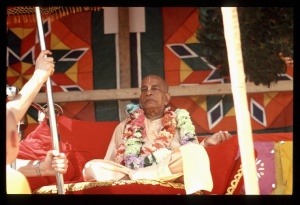SB 4.28.34

A.C. Bhaktivedanta Swami Prabhupada
TEXT 34
- hitvā gṛhān sutān bhogān
- vaidarbhī madirekṣaṇā
- anvadhāvata pāṇḍyeśaṁ
- jyotsneva rajanī-karam
SYNONYMS
hitvā — giving up; gṛhān — home; sutān — children; bhogān — material happiness; vaidarbhī — the daughter of King Vidarbha; madira-īkṣaṇā — with enchanting eyes; anvadhāvata — followed; pāṇḍya-īśam — King Malayadhvaja; jyotsnā iva — like the moonshine; rajanī-karam — the moon.
TRANSLATION
Just as the moonshine follows the moon at night, immediately after King Malayadhvaja departed for Kulācala, his devoted wife, whose eyes were very enchanting, followed him, giving up all homely happiness, despite family and children.
PURPORT
Just as in the vānaprastha stage the wife follows the husband, similarly when the spiritual master retires for nirjana-bhajana, some of his advanced devotees follow him and engage in his personal service. In other words, those who are very fond of family life should come forward in the service of the spiritual master and abandon so-called happiness afforded by society, friendship and love. A verse by Śrīla Viśvanātha Cakravartī Ṭhākura in his Gurv-aṣṭaka is significant in this regard. Yasya prasādād bhagavat-prasādaḥ. A disciple should always remember that by serving the spiritual master he can easily advance in Kṛṣṇa consciousness. All the scriptures recommend that it is by pleasing the spiritual master and serving him directly that one can attain the highest perfectional stage of devotional service.
The word madirekṣaṇā is also significant in this verse. Śrīla Jīva Gosvāmī has explained in his Sandarbha that the word madira means "intoxicating." If one's eyes become intoxicated upon seeing the Deity, he may be called madirekṣaṇa. Queen Vaidarbhī's eyes were very enchanting, just as one's eyes are madirekṣaṇa when engaged in seeing the temple Deity. Unless one is an advanced devotee, he cannot fix his eyes on the Deity in the temple.